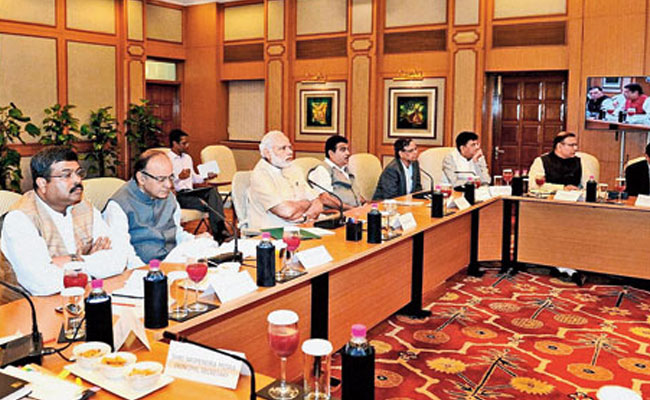7th Pay Commission: Government May Clear Big Pay Hikes Today
 |
| The Union Cabinet is likely to take up today Seventh Pay Commission recommendations (File photo) |
Highlights
- Pay Commission recommended 23.55% hike in salaries, allowances, pensions
- This will put added burden of Rs. 1.02 lakh crore on exchequer annually
- Sources say the Finance Minister has made provisions for the payout
New Delhi: The Union Cabinet may clear the Seventh Pay Commission today that would hike the salaries and allowances for over one crore central government employees and pensioners by at least 23.5 per cent.
Implementation of new pay scales recommended by the 7th Pay Commission is estimated to put an additional burden of Rs. 1.02 lakh crore on the exchequer annually or nearly 0.7 per cent of GDP. The hike, however is the lowest in last seven decades.
The government however is eyeing the economic push the move will provide to the sluggish demand scenario in the economy.
The panel headed by Cabinet Secretary PK Sinha was set up to study the recommendations of the pay commission headed by Justice AK Mathur. The committee has submitted its report to the Finance Ministry.
The move will impact the remuneration of nearly 50 lakh central government employees and 58 lakh pensioners. The changes are likely to be implemented from January 1, 2016.
The key recommendation of the 7th Pay Commission is a 23.55 per cent increase in salaries, allowances and pension of central government employees and pensioners. This is built around the recommendation for a 14.27 per cent hike in basic pay.
Of the total cost of Rs. 1,02,100 crore, pay increase would cost Rs. 39,100 crore, increase in allowances Rs. 29,300 crore and increase in pension Rs. 33,700 crore.
Based on the proposed rate of hike, Rs. 73,650 crore of the total payout will come from the general budget, while Rs. 28,450 crore will come from the Railways.
One of the key changes suggested by the pay commission has been the ‘New Pay Structure’, under which the existing system of pay bands and grade pay will be ejected and a new pay matrix will be brought in to bring about more transparency.
The 6th Pay Commission had recommended a 20 percent hike which was eventually doubled when it was implemented in 2008.
The highest pay is pegged at Rs. 2,25,000 per month for apex scale and Rs. 2,50,000 per month for cabinet secretary and others at the same pay level.
The rise will be more than double as the current pay in this scale is Rs. 90,000 per month. With this hike several senior government posts will get a salary higher than lawmakers in Parliament.
The move has led to the discontent among the lawmakers who allege disparity. However, the government is also considering a hike in salaries and allowances of lawmakers.
The minimum pay recommendation is Rs. 18,000 per month. This too is more than double of the present Rs. 7,000.
The commission has also recommended a hike in the annual increment rate to 3 per cent from the existing 2.5 per cent, increased HRA and enhanced gratuity.
Sources say Finance Minister Arun Jaitley has made provisions for the payout. Though the government is making an effort to increase revenue by bringing more under the tax net, the payout will reduce the government’s kitty. Especially, because the Centre also needs about Rs. 70,000 crore to meet the One Rank One Pension (OROP) commitment.
But the government is not complaining. The huge payout, once implemented, will boost the consumption demand at a time when the economy is moving sluggishly due to poor demand.
A finance ministry source said, “Government employees are traditionally known to invest pay commission benefits into few specific sectors like real estate. If they follow the tradition, the real estate sector hit by poor demand may turn out to be the biggest beneficiary.”
While some experts believe that the additional cash in the market may fuel an inflationary trend, experts say that the impact of the pay commission may become a turning point for the Prime Minister Narendra Modi’s government to trigger demand that drives growth investment and profits.
Via: NDTV

Leave a Reply